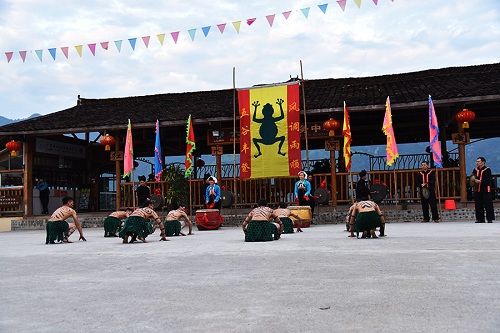National Culture Heritages in Guangxi (Festivals)
Panwang Festival of the Yao Ethnic Group
Panwang Festival is the grandest festival of the Yao ethnic group. It is a traditional festival dedicated to ancestral worship, featuring distinctive Yao singing and dancing.
The date that the Yao nationality celebrates the Panwang Festival is inconsistent. It is usually held after the autumn harvest before the Spring Festival. It can be celebrated separately by families or collectively by several villages, lasting from three days and two nights to seven days and nights.
The Panwang worship ritual consists of two parts: priests performing Panwang dance with the Suona band; as well as people singing songs of the myth, history, politics, economy, culture, art, and social life of the Yao people.
On May 20, 2006, the Panwang Festival of Yao Ethnic Group was approved by the State Council to be listed in the first batch of national intangible cultural heritages.
Frost's Descent Festival
Frost's Descent Festival is a typical folk activity of the Zhuang ethnic group and is mainly popular in the Tianzhuang, Daxin, Debao, and other counties of Guangxi Zhuang autonomous region.
Every September in the lunar calendar, during the frosty period after the end of the late rice harvest, the Zhuang people use the new glutinous rice to make special food to entertain friends and family. People also have the opportunity to make friends, call on relatives, take part in singing and dancing activities, as well as sell agricultural products and purchase appliances for work and living during the festival.
Nowadays, the festival has developed from a simple celebration of the harvest into a comprehensive folklore activity for paying tribute to the sacrifices of national heroes, conducting business activities, and performing folk culture performances.
The festival has been included in the fourth batch of national intangible cultural heritage expansion projects on Nov 11, 2014.
Maguai Festival of the Zhuang Ethnic Group
Maguai culture has been a flourishing tradition for the Zhuang people that live alongside the Hongshui River of Guangxi. Maguai in the Zhuang dialect is the name for frogs, which are considered sacred for the Zhuang ethnic group.
In ancient times, the locals would dress up as frogs and dance to ask for a good harvest. The festival usually begins on the first day of the Lunar New Year and ends on the second day of February. A set of activities will be held during the festival, such as folk performances and folk games.
The Maguai festival of the Zhuang ethnic group has been included as one of China's national intangible cultural heritages since May 20, 2005.

People of the Zhuang ethnic group perform the Maguai dance at the Maguai Festival. [Photo by Xiang Yanan/chinadaily.com.cn]














